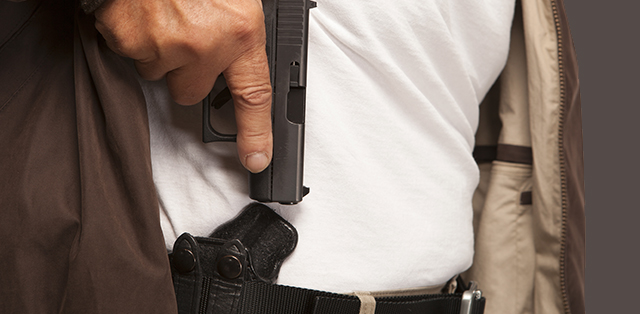Uncategorized
CONCEALED CARRY OPTIONS
There are over 17 million Americans with concealed carry permits. Since people come in a great variety of shapes sizes and physical conditions, it should be obvious that not everybody is going to be comfortable carrying a concealed handgun in the same way. In addition, there are pros and cons to the various methods of concealed carry, so it’s important to make an informed decision.
Strong Side Carry
Carrying just behind the strong side hip is the preferred method of most professionals. In warm weather strong inside-the-waistband strong side holsters can conceal full-size pistols well. In cold weather outside-the-waistband holsters conceal the gun well if you’re wearing a jacket or coat. Next to pocket carry, it’s probably the best carry method for defending against a gun grab, and it only requires a one-handed draw, making it very fast and useful if your support hand is injured.

Lynn givens of Rangemaster Training draws from a strong-side carry. Notice that her right hand has swept her jacket away from the gun as she presents it from under her vest.
Pocket Carry
Pocket carry works well when wearing shorts, slacks, vests and light jackets, provided you carry a light, thin handgun and use a holster that stays put in your pocket when you draw. On the plus side, it allows a person to walk around with a hand on the gun and not raise suspicion, and that’s a strong point if you have to walk alone in the dark. Just make sure that the holster covers the trigger, that you have nothing in your gun pocket except the gun and holster and that your finger stays off the trigger until you’re on target just as you’d do when drawing from any type of holster.

This soft, flexible pocket holster came with the Ruger LCP.
Off Body Carry
Off body concealed carry is popular with women and getting more popular with men. That’s because we have so much to carry nowadays. In addition to a gun and spare ammo, a lot of us also carry wallets, smart devices, epi-pens, tactical lights, pepper spray, etc. A lot of us drive a lot, and if your gun is in your carry handbag, you can tether the handbag to your seatbelt and eliminate the hassle of trying to draw while belted in. On the negative side, if someone grabs your handbag he’ll also have your gun. So if you carry off-body develop good situational awareness, have a sturdy bag with a solid strap and be prepared to defend against handbag theft.


This ladies’ handbag from Browning has a lockable inner pocket that easily conceals an S&W J-Frame revolver.

If you carry off-body, make sure your carrying strap is heavy and has strong attachments to the body of your handbag.
Appendix Carry
Appendix carry is the latest fad. It conceals the gun well and positions it for fast presentation, but it often requires a two-hand draw. It’s also very easy to sweep the muzzle of your gun across your lower abdomen and legs when drawing and re-holstering using an appendix holster, especially when you’re sitting down or when you try to use a one-handed draw. Fortunately, there are courses that teach appendix carry, and it’s a good idea to take one before carrying in this mode.

Instructor Eve Kulcsar of RokaArms Training demonstrates the appendix draw at the Rangemaster Tactical Conference. Notice her trigger finger is not on the trigger.

This ambidextrous inside-the-waistband holster from Crucial Concealment can be used with an S&W Shield in either the appendix or strong side positions.
Ankle Carry
Ankle holsters are often used to carry back up guns and some people also use them for primary carry. However, there are real drawbacks to using an ankle holster. Drawing from an ankle holster requires the physical dexterity to quickly drop into a crouch, raise the pant leg with one hand and draw with the other. So tight-fitting slacks are out. If your gun weighs over a pound loaded, you’re also likely to have a sore leg at the end of the day. In the end, ankle holsters are best suited for people in very good shape wearing loose slacks.
Shop Ankle Holsters


This trainee at the Rangemaster Training Conference executes a two-hand draw in which he twists and stoops to his left, raises his pants leg with his left hand, draws with his right and then stands up to assume an isosceles two-hand stance before he fires. It takes speed and agility to make this draw work.
Other Methods
There are other, lesser-used concealed carry methods. Cross-draw and shoulder holsters require over-garments and are vulnerable to a gun grab. Belly bands can be problematic if you’re overweight. A small-of-the-back holsters present a real risk of injury if you are pushed over backwards in a confrontation and your spine lands on the gun.
Your Choice
The choice is up to you. Consider your needs carefully and choose the method or methods of concealed carry that fit your abilities and lifestyle.
Shop All Holsters

This well-used horsehide right-side custom holster by Rusty Sherrick works very well with the Glock 43. It was built to the author’s specifications.


Hello, dear readers!
I want your advice. There is a bonus for online casinos. I don’t know how to make the best use of it.
got a bonus here:Bonus
What do you advise? What is the best game to play where the chances of winning are higher?
I have read some excellent stuff here. Definitely value bookmarking for revisiting. I wonder how much effort you put to make the sort of excellent informative website.
Hello from Sporthappy.
Nice post. I learn something totally new and challenging on websites
Thanks for the post
Restoration of baths